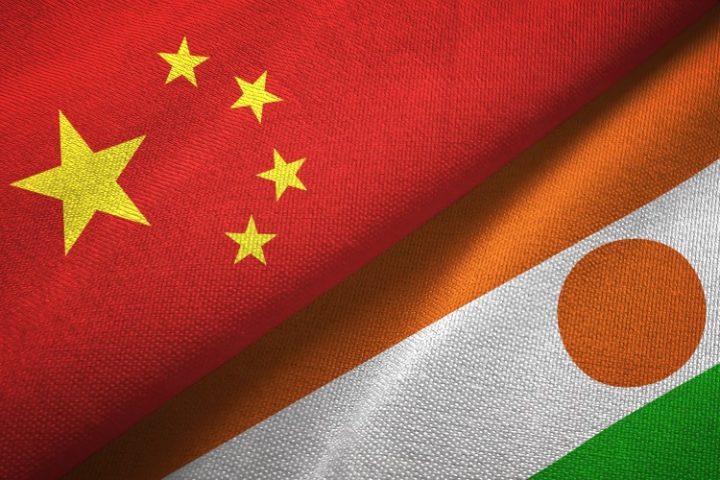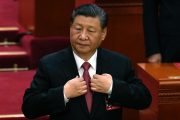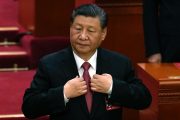
On September 4, Jiang Feng, China’s ambassador to Niger, declared Beijing’s plans to bring about a peaceful resolution to the Niger crisis, following a coup in July that deposed President Mohamed Bazoum, which led to sanctions and left the country facing the prospect of external military intervention.
“The Chinese government intends to play the role of good offices, a role of mediator, with full respect for the regional countries,” Jiang stated during a meeting with military-appointed prime minister Ali Lamine Zeine.
Feng added that although China “stands with Nigeriens” amid the political crisis, it would abide by its principle of non-interference in the domestic matters of other countries.
Niger’s military government has faced increasing regional and global coercion to step down since assuming power.
Meanwhile, the Economic Community of West African States (ECOWAS) has announced that it will explore all possible ways to reinstate constitutional order in Niger, without excluding the use of military force. Last month, ECOWAS revealed that its standby force stood ready to be mobilized against the coup leaders if ongoing diplomatic solutions failed.
Also, Algeria introduced a six-month transitional plan to restore constitutional and democratic order in Niger late last month, after Niger’s General Abdourahmane Tchiani’s suggestion to return his country to civilian rule within three years.
Algiers has constantly objected to a military intervention in Niger, including reportedly denying France’s request to fly over its airspace for a military operation in Niamey.
ECOWAS, which has enforced financial and economic embargoes on Niger, has dismissed Tchiani’s transition plan, lambasting the “prolonged” timeline as a “provocation.”
On their end, France, the United States, the Netherlands, and Germany have stopped some foreign assistance projects in Niger after Bazoum’s ouster.
In contrast, Jiang assured the new Nigerien leaders that Beijing would continue all existing projects that were in their interest.
China has been Niger’s partner in several fields, such as energy, oil, and infrastructure, with both nations cooperating on a milestone 2,000-kilometer oil export pipeline project to transport crude oil from the Agadem fields in southern Niger to the port of Seme in Benin.
Meanwhile, military-appointed prime minister Ali Lamine Zeine stated on September 4 that Niger expects a rapid departure of French troops amid worsening bilateral ties. “The government has already revoked the deals that allow for the French troops to operate on our territory,” Zeine told reporters in the capital Niamey.
The French forces are in Niger “illegally,” Zeine alleged, elaborating that “talks are underway, which should allow for a swift withdrawal.”
Earlier this year, French troops pulled out of Burkina Faso after the country’s military rulers demanded that they leave. Furthermore, France also withdrew its troops from Mali after hostilities with the military government following a coup in 2020.
Since July 26, protests demanding the withdrawal of the French Army from Niamey have increased, with Niger’s coup leaders scrapping military agreements that permitted French forces to combat jihadist insurgents in the Sahel region last month, giving France only a month to withdraw its 1,500 troops.
Niger’s new leaders have also called for the “immediate expulsion” of France’s ambassador, Sylvain Itté, after he denied meeting them, as France does not recognize the legitimacy of their authority.
Paris has ignored Nigerien demands to withdraw its troops and envoy. Rather, it has voiced its backing for ECOWAS sanctions and a potential military intervention to restore Bazoum’s regime.
Previously, the French military supposedly cautioned that it was prepared to retaliate if renewed tensions in Niger threatened its base and diplomatic facilities.
Zeine, however, said military action by ECOWAS did not enjoy the support of all its member states.
“Out of the 15 ECOWAS members, maybe three or four are behind a military intervention,” Zeine said, as cited by Bloomberg. “All the dispositions are in place, and we’re ready to defend ourselves if it comes to it.”
Zeine stated that the new rulers, whose proposal for a three-year transition was dismissed by ECOWAS, “have hopes of reaching an agreement” with the alliance in the “coming days.”
Apart from offering to act as mediator in the Niger quagmire, the Chinese have made various diplomatic strides in other regions of the world. In June this year, Chinese authoritarian leader Xi Jingping, together with his Palestinian Authority (PA) counterpart, Mahmoud Abbas, disclosed that both sides had inked a strategic partnership, with Beijing offering to mediate between the PA and Israel as well as enable unity among rival Palestinian political parties.
Although it might be far-fetched to think that Beijing would be able to persuade Israel to agree to any solution with the Palestinians at the moment, Beijing’s mediating role could put Israeli-U.S. ties to the test and compel and force Israel to adopt a more definite stance as to whether it is going to align with the West or seek to incorporate itself into the Middle East.
Another of China’s noteworthy diplomatic achievements in the Middle East was the Beijing-brokered Saudi-Iranian rapprochement. Although the thaw in Iranian-Saudi ties does not mean that both nations have completely buried the hatchet in terms of past grievances, their outward declaration of rapprochement nevertheless raised eyebrows in Washington, as the United States still regards the Middle East as its own backyard and Israel as its Western outpost. Saudi Arabia and Iran’s decision to restart diplomatic ties has undoubtedly elevated Beijing’s diplomatic profile and political clout. Besides the erstwhile hostile Middle Eastern powers vowing to improve ties, Saudi Arabia also became a dialogue member of the pro-China Shanghai Cooperation Organization (SCO), further testifying to China’s rising diplomatic status. The two Middle Eastern nations are also set to join the BRICS alliance on January 1, 2024.
Since the emergence of the Belt and Road Initiative (BRI) in 2013, China’s involvement in conflicts has gone beyond its past policy of limited engagement. Before 2013, China seldom got involved in international mediation initiatives, instead opting to be a neutral onlooker. Nonetheless, over the years, Beijing has shown its willingness and ability in conflict resolution and shaping such outcomes to its commercial and political benefit.



